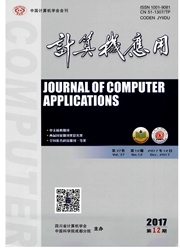

 中文摘要:
中文摘要:
针对以往关于云资源管理分配的研究中多从云运营商的角度出发,未充分利用用户评价来改善资源决策能力的问题,提出了一种关注用户服务评价反馈的资源再分配方法。首先,通过分析云中心资源分配的过程,抽取出影响资源决策的要素,提出关注用户服务评价的自适应云资源分配框架;其次,阐明用户服务评价参与云资源管理的基本原理,建议一种用户服务满意度的量化度量;最后,基于相似性理论,预测用户对新任务的期望满意度,合并用户任务参数以及当前环境参数,作为BP神经网络的输入,进行资源分配方案的决策。在和无用户评价参与的资源分配方案比较的仿真实验中,其平均用户满意度提高了7.4%,保持在0.8以上,总体呈稳定上升趋势;与Min-Max算法、云任务与云资源满意婚配(CTRSM)算法比较,平均用户满意度分别提高了16.7%和4.6%。实验结果表明关注用户服务评价反馈的资源再分配方法是能够自我完善的,能够提高云资源自适应管理的能力。
 英文摘要:
英文摘要:
Concerning the problem that previous studies mostly consider from the resource provider's perspective, and user's evaluations have not been fully utilized to improve the resource decision making ability, this paper proposed a resource re-allocation method focusing on the user's evaluation feedback. First, through analyzing the process of cloud resource allocation, several factors influencing decision-making were defined, and an adaptive cloud resource management framework with user's involvement was proposed. Next, the main idea of method of resource re-allocation with user's involvement was elaborated, and a formula was designed to guide user's evaluation. Finally, based on similarity theory, the user's expected satisfaction of a new cloud task was predicted. Together with the cloud task parameters and environment parameters, it was used to be the input of BP ( Back Propagation) neural network to make the resource allocation decision. In the comparison experiments with the allocation scheme without user's involvement, the average user's satisfactory of the proposed scheme increased by 7.4%, maintained at more than 0.8, showed a steady upward trend. In the comparison experiments with Min-Max algorithm and Cloud Tasks-Resources Satisfactory Matching (CTRSM) algorithm, its average user's satisfactory increased by 16.7% and 4.6% respectively. The theoretical analysis and simulation results show that the cloud resource reallocation method focusing on user's evaluation is self-improved, and it can improve the adaptive ability of cloud resource management.
 同期刊论文项目
同期刊论文项目
 同项目期刊论文
同项目期刊论文
 期刊信息
期刊信息
